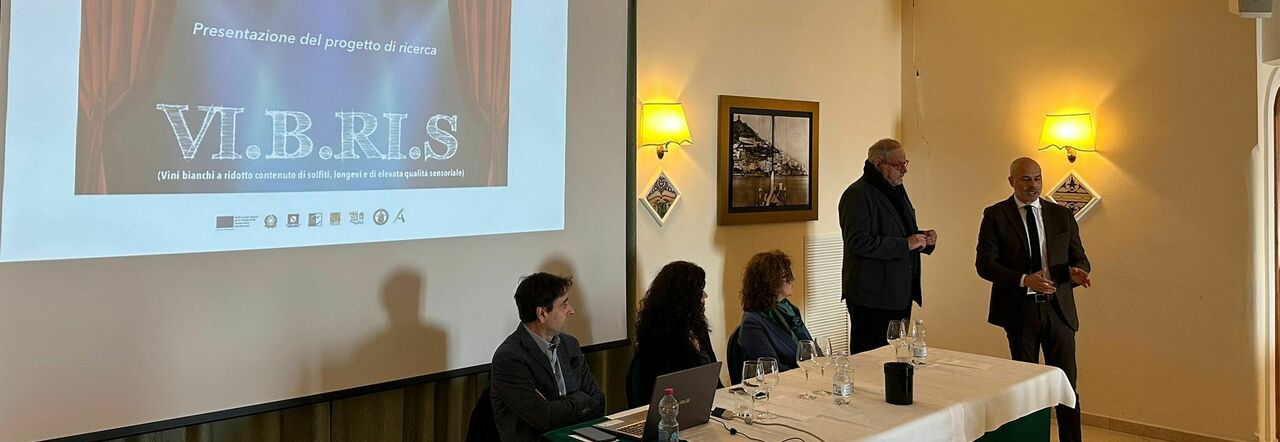The experimental project to create long-lived and high sensory quality white wines in the Amalfi Coast through new scientific methods of transforming grapes from ungrafted vines, which involve a reduced content of sulfites, has been successfully completed.
The examination for the Fenile, Ripolo, Ginestra and Pepella vine varieties has been widely passed, as confirmed by the studies produced by the Section of Enological Sciences of the Department of Agriculture of the University of Naples Federico II, which analyzed the nectars produced by five companies of the Coast: Cantine Marisa Cuomo, Marisa Cuomo Agricultural Company, Reale Agricultural Company, Giuseppe Apicella Wineries, Tagliafierro Raffaele Agricultural Company.
The initiative, promoted by the five companies of the Coast in collaboration with the Federico II University and co-financed by the Fears - Psr Campania 14/20 Gal Terra Protetta, involved the three sub-areas of the Dop Costa d'Amalfi (Furore, Tramonti and Ravello) and in particular four native vine varieties vinified first with zero preservatives and subsequently with small doses of sulfites.
The reduction of SO2 doses in winemaking is a topic deeply felt by the wine industry - the members of the scientific research committee explained within the V.I.B.R.I.S Project. However, considering the protective actions performed by SO2, antimicrobial and antioxidant, the effect of its elimination from the winemaking process or the reduction of doses can negatively affect the quality of the wine. Therefore, alternative winemaking protocols 'no-sulphite' or 'low-sulphite' need to be developed and evaluated carefully, through a scientific approach.
During the project, an in-depth analysis of the grapes was initially carried out and subsequently, in the first year of the project, a conventional winemaking protocol with the addition of sulfites was compared with an alternative protocol that did not provide for any addition of preservatives, or the use of natural origin additives and aids with antimicrobial and antioxidant action such as fungal origin chitosan, inactive yeasts rich in glutathione, enological tannins.
The wines produced have been analyzed from a chemical and sensory point of view - explained Martino Forino (Associate Professor of the Department of Agriculture), Angelita Gambuti (Associate Professor of the Department of Agriculture) and Maria Tiziana Lisanti (Fixed-term Researcher of the Department of Agriculture) who together with Luigi Moio (Full Professor of the Department of Agriculture) and Nicola Matarazzo (economist, technical scientific manager), made up the working group of wide technical-scientific thickness.
The chemical analyses showed that the action of the alternative aids used had the desired effect, but the levels of protection from the oxidative risk to the coloring matter of the wines was lower than that of SO2. The sensory analysis highlighted the appearance of oxidation defects in wines produced with alternative protocol. Although these defects were of weak intensity, considering their masking action on the sensory identity of the wine and the qualitative potential of the varieties considered in the study, it was deemed appropriate to modify the alternative protocol without added sulfites, providing for the addition of a small dose of SO2 to the racking, in order to increase the antioxidant protection. The results of the chemical and sensory analyses of the experimental wines have shown that the alternative protocol with a reduced dose of added sulfites was able to overcome the critical issues identified in the first year and to produce wines of good sensory quality.
The project carried out in the Amalfi Coast was supported to promote a viticulture that protects and enhances local biodiversity and consumer health, in a period when the global trend is increasingly that of a return to a 'light' winemaking.
Now, on the basis of the results obtained for each grape variety, a specific experimental winemaking protocol has been developed capable of guaranteeing a high quality and long-lived product. The results will be included in the development of guidelines for the production of high quality white wines with reduced sulfite content, which will be available to all producers in the area.
The production of high quality wines with low concentrations of SO2 responds to the demands of consumers, increasingly attentive to the health aspect and eco-sustainable viticultural practices, contributing to the growth in value of the local wine sector, heavily bent by the pandemic crisis due to Covid19 - explains Nicola Matarazzo and continues - The examinations produced during the study will certainly have advantageous repercussions on the wine companies present in the territory, first of all with the scientific knowledge in terms of metabolic profile of the historical white berry grapes of Campania under study (Fenile, Ripoli, Ginestra and Pepella) and the white wines produced by them.
Now all producers have data and processes available to increase the image and reputation of their productions and the territory.

